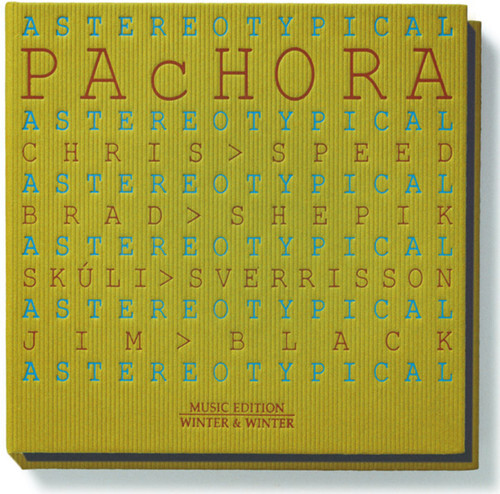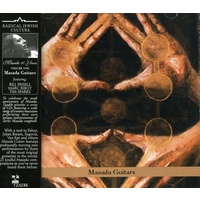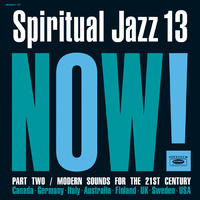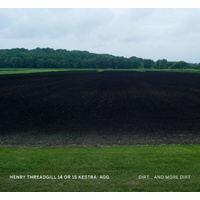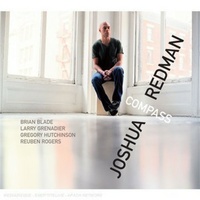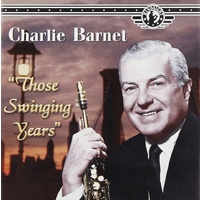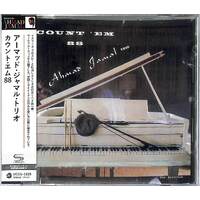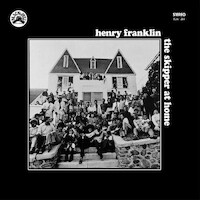2003 release
"Astereotypical is both a peak achievement for the quartet and a recording in which the artistic persona of each bandmember stands in bold relief. And it's unquestionably one of the top CDs of 2003, regardless of genre."
(Dave Lynch)
September 2003
All About Jazz:
"Take three guys from Seattle and another from Iceland, put them in a band in New York City, and you still might be surprised to hear they can play some of the most intriguing Eastern European-inspired songs you've ever heard."
(Sean Patrick Fitzell)
Chris Speed [clarinet];
Brad Shepik [tambura, electric saz, nylon string guitar];
Skuli Sverrisson [acoustic bass, guitar, electric bass, baritone guitar];
Jim Black [drums, percussion, pianica]
When the late jazz broadcaster Felix Grant spoke about his fateful first trip to Brazil in the late 1950s, he emphasized that he discovered not just a new style of music, but a whole world of music, one that informed the listener about every aspect of Brazilian life. That the LPs Grant brought back to the US contained the first bossa nova to be heard on US radio, and were passed around to musician friends like guitarist Charlie Byrd, who created the jazz template for Brazilian music almost exclusively on their basis, is somewhat secondary to this point: Music has the ability to convey its culture in all its aspects.
That is certainly the case with the traditional music of Eastern Europe. Life cycles spanning weddings and funerals, the awe of God and Nature, the overwhelming ratio of endless deathly nights to fleeting incandescent moments of joy, and the bonds and feuds borne of blood, are all embedded in the music of the region, whether it be the serpentine melodies and randy sprinting rhythms of Macedonian wedding music, or the quavering polyphony of Bulgarian choral music. This partially explains why, during the aftermath of the zipless Persian Gulf War, perhaps the most somnambular period in US history since Eisenhower donned a Sioux headdress and Felix Grant went to Rio, the world of Eastern European traditional music became a primary lens for a then emerging vanguard of American musicians: This was music as real as it gets, from a region on the brink of cataclysm.
The impetus of the articulation of traditional Eastern European music by this network of musicians was close to 180 degrees from that of Brazilian music by Byrd, Stan Getz, and its other early jazz progenitors. Whereas Brazil encapsulated a casual, if not innocent sensuality, a realm of sun blurring identity, origin, and status, Eastern Europe entailed a mind-bending juxtaposition of historical forces and cultural values that wed zeal and loss in every human endeavor. Bathing in Brazilian music makes everyone feel tall and tan and young and lovely; absent are the razor-sharp, compelling passions that paradoxically constitute the common denominator between Eastern Europe’s various music traditions, and delineate them well beyond ethnicity, to village and family line.
To say, then, that Eastern European traditional music requires a rigor that is counter-intuitive to the above average, media-saturated American is an understatement. Assimilating the art of clarinetist Tale Ognenovski is not the same as copping some Michael Brecker licks. Holding one’s own in saxophonist Yuri Yunakov’s Bulgarian wedding band is a little different than playing along with Music Minus One discs. That’s the rigor clarinetist Chris Speed and guitarist Brad Shepik respectively bring to Pachora, which is evenly matched by that of drummer Jim Black and bass player Skuli Sverrisson. It is the prerequisite for making a ruchenitsa, a Thracian dance form in 7/8, a digable groove for the generation of Americans who saw the space shuttle Challenger blow up on TV at school.
It’s this rigor that makes Pachora sound like they have been shedding around the clock for years on end, when, in fact, the musicians’ respective if-it’s-Thursday-it-must-be... schedules only allows for occasional activity. While their precision and energy on <<Astereotypical>> can be rightly attributed to overlapping histories in a myriad of bands, the power of the source materials should not be underestimated. Regardless of how extensively aspects of Eastern European traditional music are retooled by the musicians’ respective polyglot sensibilities, it does not -- it can’t -- diminish the music’s unique ability to trigger a hyper-acuity in those who play it and those who hear it. Listening to Mozart might goose your IQ up a point or two for twenty or thirty minutes; but, the music of the Balkans and its adjacent regions seizes your brain stem and wraps it around the enormity of life.
Pachora creates an alluring portal to this world of music, in which the listener soon experiences increased tactile sensitivity, slightly accelerated respiration marked by a flaring of the nostrils, and a keener eye, if not improved vision. This is accompanied by a heightened sense of physical agility, often resulting in vigorous dancing. If the flailing reaches a vertigo-inducing pitch, the listener spirals through a sheepskin lined worm hole, which deposits him or her in any number of places -- a village in the Pirin District; a cafe in Skopje’s old quarter; the brass band festival in Guca. Normalcy, however, is too soon restored; the most lasting side-effect, a Cliché Reflex Deficit, causes prolonged silence or real discourse. This is music as real as it gets.
by Bill Shoemaker
(025091008223)
| SKU | 025091008223 |
| Barcode # | 025091008223 |
| Brand | Winter&Winter |
Be The First To Review This Product!
Help other Birdland Records users shop smarter by writing reviews for products you have purchased.

